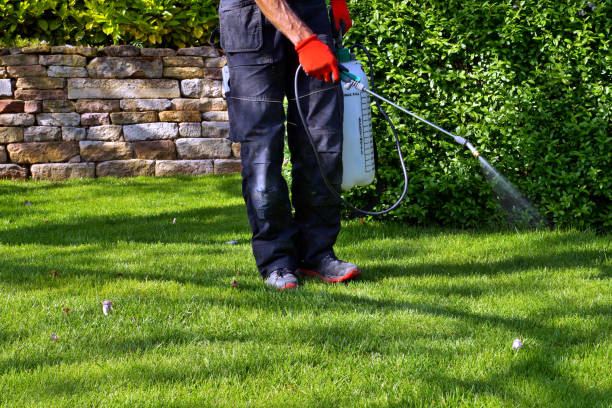Envision yourself in a beautiful garden, surrounded by a riot of colour from the flowers and the bounty of veggies and other plants. But lurking in this picture-perfect setting are the enemies that pose the greatest threat to the harmony and beauty we seek to create: weeds.
But have no fear; we have the answer, and it involves a blend of technique, precision, and even some artistry: spraying weeds.

Spraying weeds can be an effective weapon in the hands of an experienced gardener who has a firm grasp of plant biology. Selective herbicide or organic alternative use is a method of controlling weeds without hurting desired plant life.
Weed control is now a nuanced dance between gardener and garden as time, dose, and treatment methods must all be carefully considered.
The fascinating nuances of weed spraying will be explored in depth throughout this article. We will cover the many herbicides and their effects on the environment, as well as new methods for increasing efficiency, to help shed light on this important facet of gardening and reveal its full potential.
Whether you’re an experienced gardener looking to hone your spraying techniques or a complete rookie wanting to understand the ins and outs of weed control, this article will provide you with the knowledge and inspiration you need to grow a garden that blooms with energy.
Put on your gardening gloves, prime your sprayers, and come along as we explore the fascinating world of weed control. Let’s all find our inner gardeners and raise the bar for gardening as a whole.
What Is Spraying Weed?
To “spray weeds” is to use herbicides or other compounds to manage and get rid of weeds, which are unwelcome plant species. Wildflowers and other desirable plants can be negatively impacted by weeds because they grow so rapidly and compete with weeds for resources like water and sunlight.
Herbicides are chemical compounds developed to specifically kill or prevent the growth of weeds, and they are what you’ll use to spray the weeds. Selective and non-selective herbicides are the two primary groups.
To only kill the undesirable weeds and save the desirable plants, selective herbicides are developed. However, non-selective herbicides are effective against a wide variety of plant life, including beneficial species as well as undesirable weeds.
To achieve successful weed management while minimising collateral damage to the environment, the lawn weed spraying procedure must be well thought out and guided by guidelines. Timing, climate, dosage, and administration technique all play critical roles in producing the desired outcomes.
Spot spraying, broadcast spraying, and the use of specialised equipment like backpack sprayers and boom sprayers are just a few of the methods used by gardeners and landscapers to apply herbicides effectively.
Interest in natural and eco-friendly substitutes for traditional herbicides has increased in recent years. Natural herbicides made from plant extracts, manual weed removal methods, mulching, and cultural practices that encourage healthy plant growth and inhibit weed establishment are some of the options available to you.
To keep gardens, lawns, and agricultural areas in good health and appearance, weed spray is a useful tool. Proper application of this product in line with the directions provided by the manufacturer is essential to reducing weed populations and ensuring the health of the plants being grown.
However, it is essential to remember that when working with herbicides, one must always take the necessary steps to safeguard the safety of all involved, including humans, animals, and the environment.
Is Spraying Weed Beneficial?
Spraying can be an efficient method for controlling weeds provided that it is done so reasonably and safely. The following are some of the potential benefits that could result from using sprays to reduce weeds:
Weed Control
Spraying weeds offers several benefits, the most important of which is the control of weeds that it provides. Undesirable plants can compete with desirable plants for important resources such as sunlight, water, and nutrients, which can inhibit the growth and productivity of the desirable plants.
Spraying can be an effective method for preserving the health and vitality of desirable plants by allowing for the selective targeting and elimination of weeds.
Increased Crop Yields
Infestations of weeds can have a major negative impact on the amount of crop that is produced in agricultural settings. By using herbicides to kill weeds, it is possible to reduce the amount of competition that crops face, so enabling them to flourish and resulting in increased harvests.
It is possible to make more efficient use of resources, which will result in increased agricultural yield if weed interference can be avoided.
Aesthetics And Landscaping
Weeds can reduce the aesthetic value of gardens, lawns, and landscapes to varying degrees, depending on the type of environment they’re growing in. Spraying weeds can contribute to the creation of an appearance that is neat and well-maintained.
This is accomplished by removing unsightly and invasive plant species. This helps to make the area look better all around, which is a contributing factor to the total visual enhancement.
Time And Labour Savings
Particularly when dealing with bigger regions, weed removal by hand may be a procedure that is both time-consuming and labour-intensive. Gardeners and landscapers can save time and effort by spraying weeds instead of pulling them, as this can provide a solution that is more efficient and effective.
This is especially important to keep in mind while addressing substantial weed infestations or locations that are difficult to access.
Environmental Benefits
While the use of herbicides is often associated with environmental concerns, responsible and targeted spraying can offer environmental benefits. Selectively targeting weeds, reduces the need for excessive tilling or cultivation, which can contribute to soil erosion and degradation.
Additionally, effective weed control can prevent weeds from going to seed and spreading, thus minimizing their impact on ecosystems.
To reduce the risk of undesirable side effects, herbicides must be used in a responsible and well-informed manner.
This entails not just being aware of the potential effects on non-target plants, wildlife, and water sources but also following product instructions, adhering to safety recommendations, evaluating alternate weed management methods when suitable, and so on.
Spraying weeds can be beneficial, but only if done so correctly, environmental issues are taken into account, and sustainable gardening or farming practices are incorporated.
Conclusion
Spraying for weeds can be useful if done with caution, research, and a dedication to sustainable gardening or farming methods. Gardens, landscapes, and agricultural fields can all benefit from spraying weeds since it allows for the selective elimination of invasive plant species without harming desirable ones.
Spraying weeds has the potential to provide many benefits, including effective weed management, increased agricultural yields, improved aesthetics, less labour requirements, and a reduced impact on the environment.
An efficient application of weed spray can assist desirable plants gain an advantage over weeds in the competition for water, sunshine, and nutrients.
Keep in mind that weed spray is simply one of several gardening or farming tools. To achieve a well-rounded and comprehensive strategy for plant care, it is recommended to combine it with other methods, such as managing the soil, applying mulch, performing routine maintenance, and employing integrated pest management techniques.

